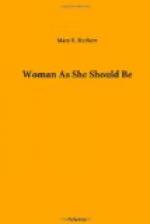Arthur laid the letter aside, and again commenced his restless pacing. Alas, he had once almost imagined himself a Christian, for had he not been sedulous in the discharge of every duty, and, like the young man referred to in Scripture, could have said, with reference to the moral law as far as outward observances are concerned, “All these have I kept from my youth up.” But now, mitigating, soothing, extracting from grief, however mighty, some portion of its bitterness, where was the resignation of the Christian? Not, certainly, in that heart so full of bitterness, that was ready to contend with heaven for having reclaimed its own; its power, its goodness, its wisdom, were almost, unconsciously, arraigned, and finite man presumed to pass judgment on the acts of infinite benevolence, until, at length, shocked at his own rebellious feelings,—and startled, nay, terrified, at this the deepest insight he had ever obtained of the natural depravity of his heart, he sank into a chair, and in utter recklessness abandoned himself to the tide of grief which seemed waiting to overwhelm him.
Oh there are terrible moments in human experience, moments when even the Christian is so haunted by the demon of unbelief, when the dire enemy of God and man takes advantage of some unpropitious circumstance, some painful affliction, to taunt the soul, already almost crushed, and to inquire, with fiendish malignity, “Where is now thy God?” that if not wholly overcome, he, at least, escapes alone with fearful wounds from the trying conflict; how then can that one sustain the assault who is totally unprepared, and who knows but little of the source from whence alone help can come? Well, indeed, for frail humanity, that there is a tender, pitying Father, who “knoweth our frame, and remembereth we are dust,” and oftentimes, when our need is sorest, sends, in his own good way, unexpected relief.
With his face buried in his hands, heedless of the lapse of time, and of anything save his own absorbing emotion, Arthur still sat in the armchair, into which he had thrown himself, his thoughts dwelling, with strange pertinacity, upon the past,—the past that seemed to mock him now.




